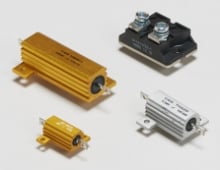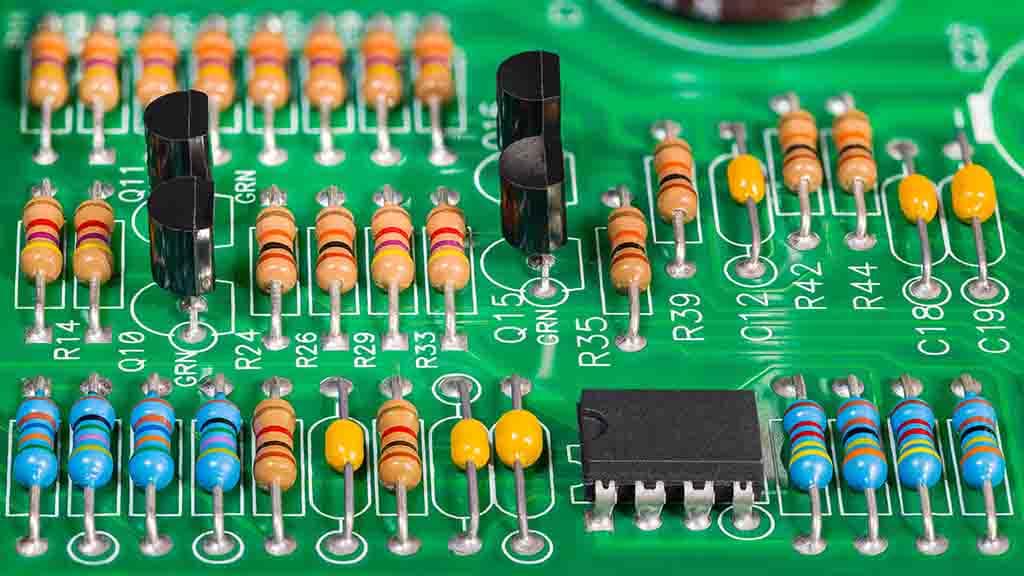A resistor is a passive component that reduces voltage or limits the current flowing through a circuit. This component can also absorb energy and dissipate this energy in the form of heat. Its resistance to the flow of electrons is determined by the conductive materials with which it is built. The materials used in the composition of a resistor perform a critical role in enabling performance reliability and stability, particularly for high-voltage, high-power, high stability/accuracy, or high-current applications. Our portfolio features two types of resistors: fixed resistors (including surface mount, through-hole, and chassis mount), which offer one resistance value and are used in almost all applications; and variable resistors (including potentiometers and trimmer potentiometers, also known as trim pots), which offer broad resistance values and are predominantly used to control either current or voltage by changing the resistance value. Choosing the right type of resistor is crucial for designing a circuit with the power, accuracy, current, or voltage needed to efficiently power any device.
Shop TE Resistors by Brand
Find the right one quickly, with filtered search
Frequently Asked Questions
Answers about types of resistors
Q: What is resistance?
A: Resistance is a measure of the opposition to current flow in an electrical circuit. Resistance is measured in ohms, which is symbolized by the Greek letter omega (Ω). All materials resist current flow to a certain degree, and they fall into two broad categories: conductors and insulators. Conductors are materials that offer very little resistance to current flow. Examples include silver, copper, gold, and aluminum. Insulators have high resistance to current flow and include rubber, paper, glass, wood, and plastic.
Q: What do resistors do?
A: Resistors have many purposes. A few examples are delimit electric current, voltage division, heat generation, matching and loading circuits, control gain, and fix time constants. Resistors are commercially available with resistance values over a range of more than nine orders of magnitude. Resistors are used in a vast array of applications and can be found in a wide range of sizes, from extremely small surface mount devices used in a wide range of electronics, to large dynamic braking resistors that are used to dissipate energy.
Q: What are the two types of resistors?
A: Resistors can be divided into two types: fixed resistors and variable resistors. Electrical resistance stays the same in fixed resistors, while it changes with a physical variable in variable resistors. Fixed resistors are widely used and have a fixed resistance value defined at the time of manufacturing, with the resistance value either printed or color-coded over them. The resistance value of variable resistors can be changed by adjusting a knob. They are used less commonly because of uncertainty and moving parts.
Q: What causes a resistor to fail?
A: A fixed resistor normally fails in an open configuration when it is overheated or overly stressed due to excessive power, temperature, vibration, or shock. Excessive humidity can cause an increase in resistance. A variable resistor can wear after excessive use; worn away particles can cause high resistance short circuits.
Read more FAQs about resistors:
What's the difference between a pre-charge resistor and an in-rush resistor? What about a braking resistor or a crowbar resistor? Which types of resistors offer short-term overload capability and which offer continuous power dissipation? Learn all this and more, in this glossary explaining the technology of our power resistors.
Find Top Resistors
by Type, Element, and More
- Thin Film Precision Surface Mount Resistors
- Thick Film General Purpose Surface Mount Resistors
- Thick Film Power Surface Mount Resistor
- Wirewound Power Chassis Mount Resistors
- Wirewound Power Surface Mount Resistors
- Wirewound Power Through-Hole Resistors
- Precision Resistor Kits for Surface Mount Resistors
- Radial-Leaded Trimmers
- Surface Mount Trimmers
- Thick Film Current Sensing Surface Mount Resistors
- Thin Film Precision Through-Hole Resistors
- Metal Film Power Through-Hole Resistors
- Metal Oxide Film Power Through-Hole Resistors












